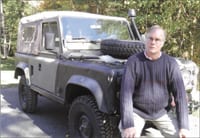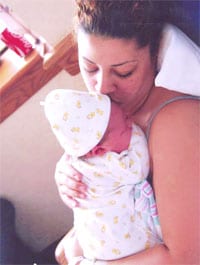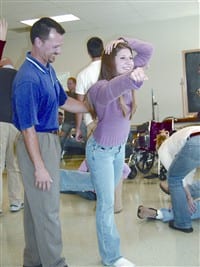A Different View Local Author Provides Insight into Asperger’s and Autism Spectrum Disorder
When John Elder Robison was a child, he thought he was “defective.”
Other children didn’t like him, and despite his best efforts, he couldn’t master social skills or figure out how to respond when people talked to him.
Robison failed continuously in school, wouldn’t make eye contact with anyone, and blurted out inappropriate responses to conversation, such as the time he cracked a grin when his mother was told about a child who had been killed. His parents were concerned and took him to several mental-health professionals who labeled him as “lazy, angry, or a social deviant,” and said he might have to be institutionalized if his behavior continued.
But Robison wasn’t malicious. He was simply different due to Asperger’s syndrome, an autism spectrum disorder characterized by restricted and repetitive patterns of behavior and significant difficulty with social interaction.
At the time, not much was known about the condition, so Robison suffered continuous shame and ostracism. “For my first 40 years, I was unaware that I had Asperger’s. I knew I was different, but I didn’t know why, and that lack of knowledge suffused me with a feeling of inferiority that permeated and poisoned my life,” he said. “Those feelings handicapped and hampered me in countless ways.”
Robison dropped out of high school and left home at age 16. At that point, a combination of luck and his savant-like “differences,” which were indeed rare gifts, led to work with famous musicians, including Pink Floyd and KISS. A professor had introduced him to electrical engineering, and the self-taught genius worked around the clock, creating revolutionary electronic breakthroughs for the industry that forever changed the world of music, including custom guitars with fiery smoke bombs inside.
Today, Robison is the author of the New York Times bestseller Look Me in the Eye, which chronicles his life growing up, and Be Different, which is filled with practical advice for “Aspergians, Misfits, Families and Teachers.”
A third book, expected to hit stores in March, is titled Raising Cubby, and is a memoir of Robison’s unconventional relationship with his son, who also was born with Asperger’s.
“It’s a unique story of parenting,” Robison told HCN, explaining that he felt compelled to write it because the majority of books about raising kids who are “different” are about “heroic moms with disabled kids,” which he deemed depressing.
“I thought there should be something entertaining and hopeful, as real stories serve a powerful social purpose,” he said. “My book about my son Cubby celebrates being unique.”
In addition to owning J.E. Robison Service in Springfield, which restores and services European luxury cars, the Amherst resident and author is a strong advocate for people with autism and neurological differences. He is involved with autism research and therapy programs at Harvard’s Beth Israel Deaconess Hospital and Massachusetts General Hospital, sits on the science and treatment boards of the nonprofit organization Autism Speaks, and serves on the Interagency Autism Coordinating Committee, which makes strategic plans that become the blueprint for treating autism in federal agencies including the National Institute for Health and the Centers for Disease Control and Prevention.
Robison also gives 30 to 40 talks each year at a wide variety of international medical centers and conferences, ranging from Massachusetts General to Mount Sinai Hospital to Baystate Medical Center’s Child Psychiatry Conference in Springfield. Last year he spoke in Australia, and this month he will lecture at the most prestigious medical schools in Italy about Asperger’s, autism, “and how we think.”
His mission is clear. “I want to show young people, parents and teachers that kids who are different bring something unique to the world and can grow up to be OK,” he said. “Sometimes people talk about autism like it’s a disease, but the world needs us. If wasn’t for autistic people, we would still be in caves. It’s people like me who invent things and drive the world forward.”
Targeted Focus
Robison said the newest Diagnostic and Statistical Manual of Mental Disorders will be published next year, and it will replace about 40 distinct conditions with the umbrella diagnosis of ’autism spectrum disorder.’
The change has generated tremendous controversy, as people fear if they lose their diagnosis, their insurance companies could cancel or withhold services. To ensure this doesn’t occur, a number of validation studies are being conducted, including one at Baystate Medical Center.
Robison says evidence from these studies shows the new criteria not only includes the vast majority of young people with prior diagnoses, but also picks up adults with other diagnoses who had not been identified with the disorder. This is important, since people who are not properly diagnosed may assume they are “defective,” which leads to poor self-esteem, he continued.
In addition, a diagnosis can give people an understanding of what they are failing to do that other people expect. “It can be an important step in making adaptive changes and allowing people to get along better in the world,” Robison said, adding that his success “is relatively unusual and was facilitated by being different.”
For example, his auto-repair facility came about due to his childhood fixation with Land Rovers. “Today, a fixation like this would be seen as a disability. But if someone starts a business related to what they are focused on, there may not be anyone else in the world who knows as much about the topic,” he explained.
Autism affects about 1{06cf2b9696b159f874511d23dbc893eb1ac83014175ed30550cfff22781411e5} of the population and is usually seen as a significant disadvantage. But Robison said taking a different viewpoint can lead someone to find answers to seemingly unsolvable problems. “Since 98{06cf2b9696b159f874511d23dbc893eb1ac83014175ed30550cfff22781411e5} of people think the same way, the 1{06cf2b9696b159f874511d23dbc893eb1ac83014175ed30550cfff22781411e5} with autism may see an obvious answer to a problem that is totally invisible to everyone else,” he told HCN.
In fact, approaching a problem from a different mindset can result in revelations and insights. “If you have different wiring in your brain, you can approach things in a unique manner. You don’t need to be smarter than everyone who came before you; you just need to have a different vision,” he said.
Robison used this gift when he worked for the music industry, and said it allowed him to envision and create things no one had ever seen or heard of before. It also led to success in his car-restoration business, and the vehicles he has worked on have been featured on magazine covers. “And it has proved true in my writing. People say my stories are unique, not because they are literary masterpieces, but because things that are obvious to me due to my differences are things other people have not seen before.”
His talents include professional photography, and he has captured images used by publicists in many venues because they are unique. For example, during this year’s circus at the Big E, he climbed a 50-foot pole and braced himself against a tower connected to a high wire to get close-ups of aerial performers. Then he went inside the lion’s cage to photograph the beasts jumping through rings of fire.
“Autistic people are often driven to be the best at what they do,” he said.
Uncommon Struggles
Still, life is not easy for people who are different. “Children are often bullied and ridiculed, which can be frightening for parents as they worry about whether their children will ever be able to live independently,” he said. “I feel my stories show these children, as well as adults and teachers, that it is possible for them to succeed and do better than other people.”
However, that can only occur if the person’s ability to hone in on a topic is directed toward something that can lead to career success, which he says does not include playing video games.
“In many instances, children get fixated on things that don’t have commercial value and don’t offer a career path,” Robison said. “Many autistic children immerse themselves in something, and their parents think the behavior is unhealthy. If it’s a dead end, it may be a problem. But rather than suppress the fixation, if parents can redirect the child to something that can have a productive outcome, it may be the best thing they can do.”
However, this can mean thinking outside the box. “If someone is fascinated with cockroaches, they may be seen as a freak at age 15, but later in life companies like Orkin may pay them a lot of money if the person becomes a world expert,” he said, referring to the large, national pest-control company.
In his case, Robison’s interests aligned with people who wanted to hire him, and although he never took a formal educational course in the areas of his success, his intense interest resulted in “thousands and thousands of hours of study facilitated by a social disability. If you don’t have friends and places to go, nothing stops you from studying 18 hours a day.”
However, not understanding how to interact socially was a real handicap for the author and inventor, who refers to his second wife as ’Unit 2’ because she is the second sister of three in her family. He said the fact that people’s social responses and interactions often defy logic was the reason why he had such a difficult time mastering acceptable responses to conversation.
However, he eventually learned the skill and realized that, if everyone was completely honest, their relationships might not survive.
“But it was frustrating and lonely growing up because I was not in sync with everyone else; if you are a logical person in an illogical world, you are isolated,” he said.
Robison hopes educating people about autism and related social behaviors can make a difference for children growing up with those disorders today. “We should be talking about remediating disability as opposed to curing it, because the world needs people who are different. These are all messages that I bring to people.”
Value and Validation
Robison believes he serves as an example of how differences can be assets. “Everything I have done is because I think differently. When I was 16 or 17, it wasn’t obvious to people that I would do anything I have accomplished, so seeing someone like me is very encouraging to people,” he said, adding that no one has any real idea of a child’s true potential.
His books are enlightening and offer an inside view of the way people with autism think and interact with the world. And it’s that striking difference that allowed the child who once thought he was “defective” to grow into a man who is giving his all to facilitate positive change in our world today.




Comments are closed.